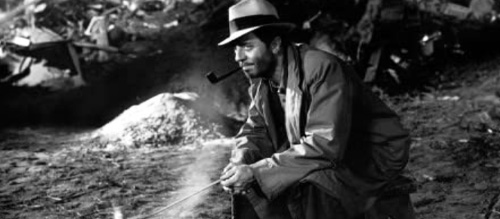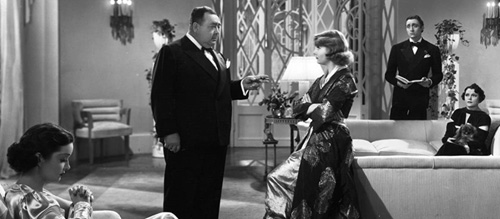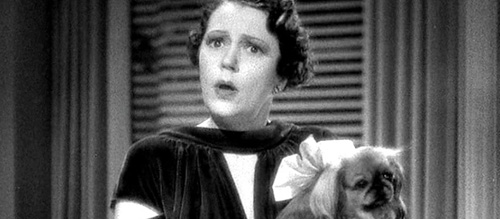85-Year-Old ‘My Man Godfrey’ Is a Crash Course in Comic Perfection
Trends in humor come and go. What was hilarious in the ’60s and ’70s was often eyeroll-inducingly silly by the ’80s, and quirky-cute ’80s humor was not nearly outrageous enough for the gross-out atmosphere of the ’90s and early 2000s. The current craze for family friendly, politically correct comedy may seem too cautious and predictable for audiences of the future.
But certain kinds of funny are always funny. Case in point: director Gregory La Cava’s 1936 masterpiece My Man Godfrey, a classic exercise in impeccable comic timing, peerless performances, and rhythmic dialogue chock full of zingy one-liners. At eighty-five years old, the average span of a human lifetime, the film holds up amazingly well today. Its billowy tone is spiked with doses of searing sarcasm, forming a timeless symphony of socially aware absurdity.
So impactful was this quintessential screwball comedy about a debutante who falls in love with her butler that it unintentionally launched an entire genre. After a reviewer of the time wrote that Lombard plays a “screwball dame,” the term was tacked on to subsequent movies in the same mold and voila! The screwball comedy was born.
Steeped in the class division heightened by the Great Depression during which it was made, Godfrey is one of those rare movies that is both a product of its time and eerily relevant decades later. The opening credits are ultra-modern: cast names flash atop swanky Manhattan skyscrapers like incandescent city signs, from which we cut away to a garbage truck spilling refuse onto an East River dump while homeless men warm themselves around trashcan fires. A purely visual beginning that already makes a statement about the rich-poor split in America—and even has a word to say about consumer waste.
Amid the heaps of landfill fodder, a “forgotten” (a euphemism for homeless) man, Godfrey Park (William Powell), encounters young elite Irene Bullock (Carole Lombard) and her snarky sister Cornelia (Gail Patrick), who want to hire him as their forgotten man, the final item on their list for a charity scavenger hunt. Irene feels guilty for using Godfrey, so she gives him a job as her eccentric family’s butler. When sensible but broke Godfrey meets the more-money-than-sense Bullocks, worlds collide. The butler transforms their lives while trying to resist his growing fondness for Irene.
Although Universal producer Charles Rogers called the film’s source material—a story by Eric S. Hatch—a “sure-fire laugh-getting novel,” it’s the Oscar-nominated screenplay by Hatch and former Marx Brothers collaborator Morrie Ryskind that separates Godfrey from the pack of other Hollywood rom-coms. The ear is treated to one perfect line of dialogue after another throughout the entire movie, a rapid-fire stream of countless quips worth repeating, memorizing, and quoting.
When Godfrey tells Irene he lives at the dump because of his asthma, she cluelessly chirps, “My uncle has asthma,” to which Godfrey replies with just the right tone of polite irony, “Now there’s a coincidence.”
Departing the dump, she takes him to the banquet hall to win the scavenger hunt, a chaotic sequence that kicks off with some humdingers.
“This place slightly resembles an insane asylum,” a gentleman named Blake tells Mr. Bullock (Eugene Pallette) as they down drinks at the bar. Bullock replies sagely, “Well, all you need to start an asylum is an empty room and the right kind of people.”
On that dead-on observation, his wife (Alice Brady) enters in full evening regalia, leading a goat on a leash with one arm, and her protegé Carlo (Mischa Auer) with the other. Blake cracks to Bullock, “Take a look at the dizzy old gal with the goat.”
“I’ve had to look at her for twenty years,” Mr. Bullock grumbles, “that’s Mrs. Bullock.”
Blake: “Oh, I’m terribly sorry!”
Bullock: “How do you think I feel?” Zing!
Once they settle into a domestic routine in the Bullocks’ Park Avenue mansion, Godfrey’s sardonic refinement plays brilliantly off of Irene’s unfiltered sincerity, as Powell and Lombard demonstrate their effortless rapport (the two actors had been married before Godfrey and remained friends).
Irene’s idea of a profound observation is: “It’s funny how some things make you think of other things.” She asks Godfrey what propriety means. She laughs at his “lovely big words.” She tells him, “You have a wonderful sense of humor. I wish I had a sense of humor, but I can never think of the right thing to say until everybody’s gone home.”
Even low-key throwaway lines are razor sharp, note-perfect, and often laugh-out-loud funny. “Like the French say, Cherchez la femme,” Carlo casually remarks when Cornelia snubs him, a blank look in his eye, obviously fuzzy on his interpretation of Berlitz phrases. A petulant Irene, dropping mysterious hints to get a rise out of Godfrey, tells Tommy (Alan Mowbray) “You wouldn’t understand.” Not missing a beat, he cracks, “Well, I don’t so far.” When a gruff police detective refers to the smart-aleck maid Molly (Jean Dixon) as “sister,” she rattles off in a dry undertone, “If I thought that were true I’d disown my parents.”
Although Hatch and Ryskind got the screenwriting credits (with uncredited contributions by Zoe Akins and Robert Presnell Sr.), Gregory La Cava was the man who made crucial last-minute revisions to the dialogue; cutting, pasting, and polishing it until the whole movie sparkled. Hedda Hopper wrote of his process: “Instead of working from a completed script, Greg writes the dialogue as he goes, frequently working on a dark soundstage until three in the morning. Ten minutes before the scene goes on, the actors don’t know what they’re going to say. But the dialogue is so natural actors ‘get it’ the first time they read it.”
Powell admitted that the director deserved the bulk of the credit for the finished film. “That was La Cava’s picture,” he recalled. “Every morning he’d give us some dialogue that he’d written during the night, and it was good dialogue.” Lombard echoed this, saying La Cava “literally gave birth” to Godfrey.
With ambitions to be a great artist but little money to buy paints and canvases, La Cava had turned to drawing comic strips as a young man. Comics led to comedic short films, and that set the Art Institute of Chicago graduate on his path to Hollywood greatness. His approach to filmmaking was that of a painter. “There are so many parts to a picture, so many things that must be taken into consideration and worked out, to make a complete whole. Out of a heterogeneous mass must come a beautiful composite,” he said in 1933. La Cava knew that comedy relies on merging multiple elements, “like making a tapestry.”
He also understood that humor is active, not passive. Jokes that read funny on the printed page don’t always translate into the visual component, which includes body language and action. La Cava worked out all the bits spontaneously, in the moment, to wring the most humor out of the situations. What a stark contrast with today, when movie rehearsals almost never happen and lines are rarely changed much on set (except for horrible accidents like the infamous improvised Ghostbusters remake of 2016).
Bringing La Cava’s lines to life is an ensemble cast doing some of their best work. My Man Godfrey was the first movie (and still one of few) to earn Academy Award nominations for all four acting categories: Best Actor (William Powell), Best Actress (Carole Lombard), Best Supporting Actress (Alice Brady), and Best Supporting Actor (Mischa Auer), an indication that every participant was performing at the top of their game.
The supporting players, according to Lombard, were “wild, crazy, deliciously insane,” leading to an on-set atmosphere that was “the maddest I ever worked in!” The actress credited her costars, as well as her director, for making the whole hodgepodge gel. “Everybody here is a specialist in his or her type of madness.”
Portly, gravel-voiced Eugene Pallette is superb, as is the masterful Mischa Auer, the ever-acerbic Jean Dixon, the understated Alan Mowbray, and the subtly sinuous Gail Patrick. And Alice Brady is a standout. Brady’s pretentious laugh and her too-loud indoor voice are spot-on for a parody of a wealthy fortysomething wife with a tiny beribboned dog in her arms and nothing upstairs but a pricey hairdo. When her husband reveals that he’s “lost a lot of money lately,” she suggests maybe he left it in his other suit. When Godfrey, explaining some fancy Wall Street trading, says he “sold short,” Brady’s air of befuddlement is so genuine when she blurts, “You sold shorts? You mean gentlemen’s underwear?” A 1936 issue of Movie Classic magazine complimented Brady on her “Alice Brady-ishness,” and that just about sums it up.
The scene preceding Irene’s tea party is a poem. Mrs. Bullock is seated in the living room, Carlo is playing piano, Godfrey is buttling, Cornelia and her beau George are lurking, and Irene enters. When Godfrey feigns obliviousness to her wiles, she affects a mood of somber hopelessness, hoping her crush will be stricken by her obvious heartbreak. Unfortunately, the tragic façade is punctured when Cornelia and George roll with laughter over Irene’s morose poses copied straight from the drama school textbook. Even Mom joins in with a hearty giggle.
The way a deflated Lombard raises her arms, briefly circles them to indicate a sphere, then flops them down at her sides as she sighs, “Life is but an empty bubble” is sheer sublimity.
In a final surge of desperation to win over Godfrey, Irene fakes a faint into his arms. Mayhem ensues when the refined butler loses his cool for once, placing Irene in a cold shower, to which she responds with delight. “Godfrey loves me!” she shouts, “He put me in the shower!” If Lombard’s madcap facial expressions and frantic, fearless clowning look familiar, it’s because she was a major influence on Lucille Ball’s performances in I Love Lucy.
In true screwball tradition (where gender roles are typically reversed), the woman is the driving force behind the relationship. Irene coerces, hoodwinks, and finally, literally forces Godfrey down the aisle.
But the film’s main takeaway may be Godfrey’s confession that, for a homeless man, his background is more privileged than we initially realize. He actually chose to flee a life of comfort to dwell with the denizens of the dump, to hang with “people who were fighting it out and not complaining.” He preferred the honesty of a hardscrabble life over the pampered Park Avenue phonies—like Cornelia, whom he compares to himself, calling her “a spoiled child who’s grown up in ease and luxury and has always had her own way.”
There is something so enduring about La Cava’s brand of quick wit, particularly when anchored by Morrie Ryskind’s gags and Eric Hatch’s satirical observations. This perfect storm of talents made My Man Godfrey a stellar example of the kind of moviemaking techniques that made Golden-Age Hollywood the world’s leader in cinema.
This Depression-era fairy tale, with its streak of barbed social satire, actually offers some hopeful class-divide solutions worth resurrecting. Ever notice how the old rich-poor unions that used to populate classic movies have vanished entirely from the screen? When and why did we start ignoring the class system in America? Couples from different ethnic or religious backgrounds abound in entertainment today, but how many pairs do we see that consist of an obscenely wealthy person and a desperately poor person who—against all the odds—break free from their respective socioeconomic circles to meet, fall in love, and get married? The last time this dynamic was explored may have been in Pretty Woman (1990), released over thirty years ago. And yet, what an inspiring theme the rich-poor divide would be for this moment in time.
How to unify this polarized country? Screwball techniques. A love story about an elite Silicon Valley one-percenter marrying an Amazon warehouse worker fighting for fair wages would do it, or a heartfelt romance between a Democrat and a Republican. Maybe even a vaccine advocate and an anti-vaxxer.
Take note, movie studios and filmmakers: My Man Godfrey’s budget was a mere $575,375, or just under $11 million in 2021 dollars. Compare that to the $160 million spent on Godzilla vs Kong (2021). For a tiny fraction of today’s blockbuster budget, you could craft a comedy that will live on long after you’re gone, one that will make your grandchildren proud, instead of a flash-in-the-pan effects extravaganza that will be eclipsed by a technically superior effects extravaganza in three months.
If class and wealth inequality are too weighty to tackle, could the entertainment industry at least bring back the Gregory La Cava brand of comedy? Simple humor based on characters in ridiculous situations, rife with sharp verbal interchanges. Not gross-out shocks. Not know-it-all hipster irony. Not bumbling pratfalls. Intelligent, witty interplay between characters we like.
How about it, Hollywood?
Written by Sloan De Forest of sloandeforest.com






